The Secret World post-mortem: "No, it's not going free-to-play any time soon"
"We need to prove this business model has not gone the way of the dinosaur."
Trond Arne Aas stepped down as Funcom boss and flogged a load of company shares the day before The Secret World launched. Did he know the game his company was betting on would tank?
If he did, he didn't share the secret.
"At launch and right after launch I was pretty convinced that this was a success - I mean commercial," Ragnar Tornquist, the game's creative director, told me in a post-mortem interview. "I could see that people loved it and everything was working. People were flocking in. It was exciting."
Joel Bylos - then lead content designer on The Secret World, now game director - was equally unprepared for what was to come.
"What I was hearing from the people playing the game in the beta, what we were hearing from the community around the game, what we wearing seeing on websites and so forth gave the indications that it was going to be very successful," he said. "It was quite a shock - everyone on the dev team was quite shocked."
That shock was The Secret World scraping only 200,000 sales. Funcom had to fire staff and dramatically restructure as a result.
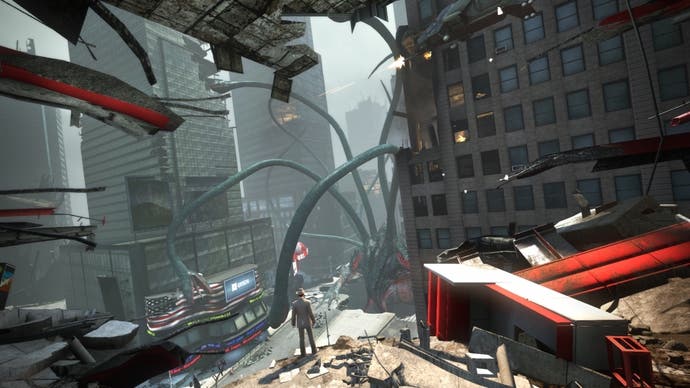
What went wrong - was The Secret World rubbish?
Not according to Tornquist and Bylos, who both stand by The Secret World as a game. Both agree it was "a success", and I believe they mean it.
But reviewers weren't bowled over, not like they have been with Guild Wars 2. Our Oli Welsh found The Secret World "a few steps short" of its genuinely exciting potential, and settled on 7/10.
"I feel like reviewers are just as susceptible to hype as any other person in the industry," Joel Bylos commented. "The scores for our game were honest, sometimes brutally so. I feel like a lot of them gloss over faults in other games that have been released. For example, the auction house [Trading Post] in Guild Wars 2 didn't work; there was trouble grouping. And a lot of reviews mentioned this but it didn't seem to affect scores."
"People will remember it as something very different, very atmospheric, very soulful: something important."
Ragnar Tornquist
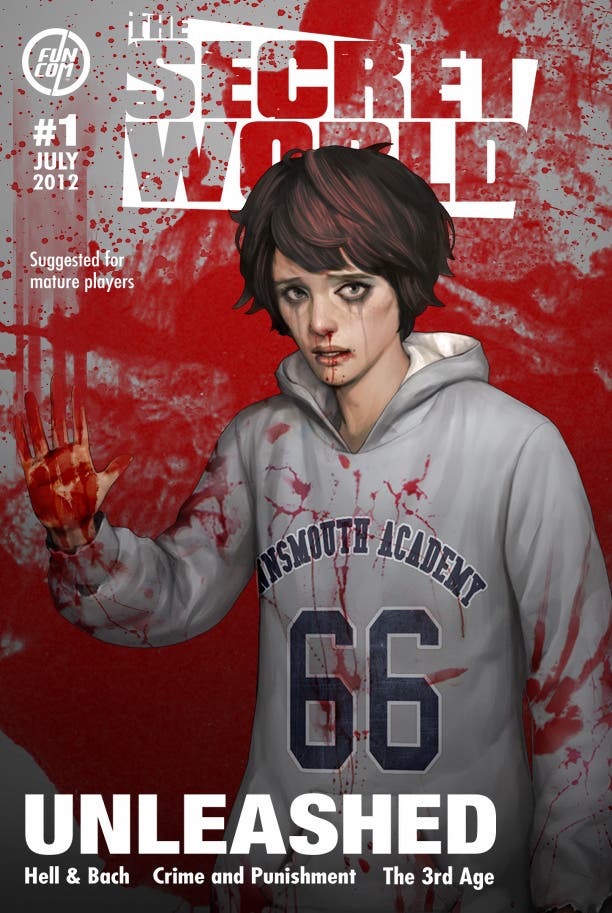
"I won't complain about any specific reviews," Ragnar Tornquist said, "but there are a couple that are horrendously unfair in my view. It's kind of sad for us to see that reviewers in general don't support - everybody cries out for change and new mechanics for new approaches to doing things, and sometimes that's difficult to pull off. It's harder than going the traditional route; we had a big challenge on our hands with The Secret World and of course there are flaws to the game.
"On some level I do wish that people would have stood behind the fact that we were trying to reinvent things, and that in the long run the game is going to improve because of that. A lot of things we did with The Secret World were done for the first time, and we needed to launch the game in order to learn how make it better.
"For us to continue development would have almost been a waste of time; we needed to get the game out there and get the feedback from players."
Player feedback was good, Tornquist and Bylos agreed. Bylos said it was "a game that resonated with designers and gamers". And now that Funcom has announced the "commercial 'failure'" (Tornquist "quote unquoted" that) of The Secret World, more people are changing their minds.
"People just sort of turned around a bit and said, 'They tried to do something new, they tried to do something different. And yeah they succeeded on some of them and didn't succeed at others, but damn it they're trying!'" Tornquist said.
"We'll keep trying; the team isn't going to give up. They'll keep forging that path ahead and hopefully that will be recognised in the long-term.
"It's not going to go away but it will be remembered a great deal; people will remember it as something very different, very atmospheric, very soulful: something important."
"We need to prove that this business model has not gone the way of the dinosaur."
Joel Bylos
What went wrong - the subscription business model?
"Subscriptions are always a challenge - I know that as a player," Tornquist acknowledged. "If I'm asked to pay a subscription I'll think twice and three times rather than just doing an impulse purchase. I'm sure that will have something to do with it.
"But at the same time, we do have subscribers, and those people are getting a lot of good content with their subscription, and they don't have to worry about having to micro-pay for everything. It is a benefit sometimes to have a subscription. But of course I understand the reticence of some people - a lot of people - to buy a game that comes with a monthly price tag. That makes complete sense. I don't want to have too many subscription games either. I think I've been paying for WOW continuously since launch.
"Those kinds of expenses are, for a lot of people, quite sizeable. But that's really not the team's call. The team made a game that worked with a subscription model, and it's a game that can also work without a subscription model. In hindsight it's so hard to tell."
Chimed Joel Bylos: "When you ask that question it's always worth considering the opposite case: we launch without a subscription and we still only sell 200,000 copies."
"That would have been really bad," said Tornquist.
"That would have been even worse," Bylos continued. "You can speculate on whether we would have sold more copies, but then how many more would we have needed to sell? From a business perspective the subscription model is somewhat safer, but perhaps not as appealing to people."
Not having a subscription worked very well for Guild Wars 2, which surpassed 2 million sales.
"Guild Wars 2 has now changed a lot," Tornquist acknowledged. "I bought Guild Wars 2 and I bought it because there wasn't any subscription - I could just buy it and test it for not too huge of an investment. And of course that's going to change things, because you can buy a full MMO now without paying a subscription, and that makes a difference."
But Joel Bylos is concerned: "Guild Wars 2 is a very high quality product funded by the largest MMO publisher in the world. Will people be expecting that quality in all free-to-play going forward? What about smaller companies like us? We want to try and create that huge experience, but we don't have five or 15 MMOs that we own that are still making money all over the world. Do the bigger companies then drive out the smaller companies?"
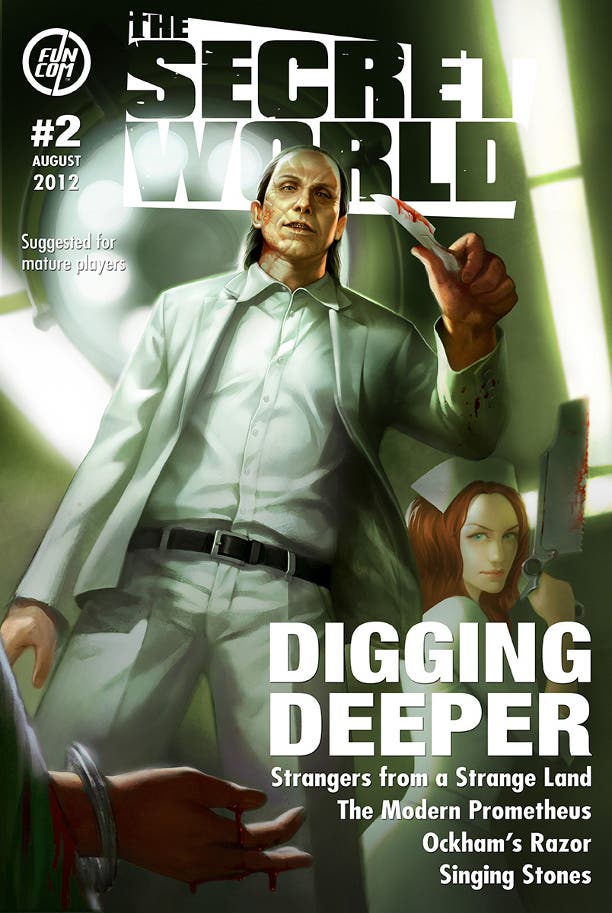
"Jesus Christ [Guild Wars 2] cost a lot of money and they're going to have to sell a lot of copies, especially without a subscription model."
Ragnar Tornquist
"I think that's their plan," answered Ragnar. "MMOs are hugely expensive, and of course Guild Wars 2 has sold a lot, and of course it's a big success. Jesus Christ that game cost a lot of money and they're going to have to sell a lot of copies, especially without a subscription model. It is a dangerous path.
"It might be the right path for MMOs; as a consumer, as a player, I appreciate it. As a developer I'm with Joel in thinking that it is unfortunate for a lot of smaller companies or medium-sized companies."
"On the positive side," Tonquist he went on, "this brings change to MMOs, and the market needs it. MMOs had stagnated, and that's something we tried to address as well. Hopefully that things are stirring up now means that there can be new games, new types of games, and those will often come from the smaller guys or the medium-sized guys, and not the big ones, because the big ones are playing it safe."
Tornquist wouldn't change anything fundamental in The Secret World in terms of game design. But he would have tried to avoid Guild Wars 2 and World of Warcraft: Mists of Pandaria.
"I would have loved to be out after Guild Wars 2 and Mists of Pandaria," he said. "It probably would have been great for The Secret World to come out now, in October, for example - that would have been a perfect time for it, especially as the game is Octoberish. It's not a summer game: it's much more of an autumn game.
"That is my biggest caveat, but there's nothing we could have - that's not up to the team. We couldn't have held on to the game until October. There's a cost involved there, too. But that would have helped a lot, actually.
"People have played Guild Wars 2 now and played the new WOW expansion. Those are great, super-polished and fun. But after playing those, people are going to be like, 'Oh OK, is there another way to do MMOs? Is there any other approach to it?' And we would have fit right in. Hopefully we can benefit from that, that Joel and the guys have some big stuff planned for this autumn so that we can bring TSW back into people's attention."
"It's better to have slow growth than drop-off," Joel Bylos said.
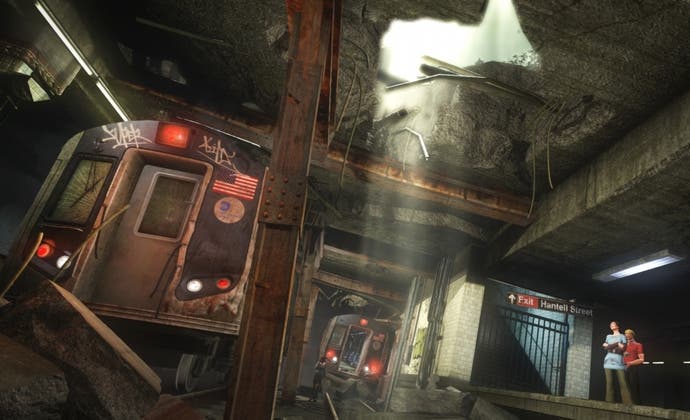
"No it's not going free-to-play any time soon."
Erling Ellingsen, director of communications, Funcom
What now - how does The Secret World go forwards?
When an MMO flops or needs revitalising it turns free-to-play. Nearly all Western MMOs prove this point, Star Wars: The Old Republic being the most recent and notable example.
That The Secret World should turn free-to-play seemed an inevitability when sales were announced. So, when?
"No it's not going free-to-play any time soon," stated Funcom's communications director Erling Ellingsen. "There's currently no plans for making it free-to-play."
"Who knows what the business model will be like in a year?" Tonquist elaborated. "Or in two years or five years? But right now, yeah, the subscription model is..."
"But of course we're always looking at it," Ellingsen butted in. "It's a fast changing business and we have to adapt ourselves. But right now there's currently no plans."
That could be a red herring - a lie. Funcom's a publicly traded company, so a revelation like TSW turning free-to-play could affect stock prices. Thus, secrecy. Plus, Tornquist mentioned above that TSW "can also work without a subscription model", and Age of Conan - Funcom's other MMO - turned from subscription to free-to-play. So Funcom knows how to do it.
But there are reasons why I believe Ellingsen: why I believe The Secret World really won't be turning free-to-play any time soon.
For one, Ellingsen said The Secret World was now profitable. I doubt that means Funcom has recouped development costs, but it probably does mean the game is paying for itself to run, because Funcom downscaled development to suit its income. I wasn't allowed to know team numbers (or subscription numbers), but was told The Secret World team was still the biggest in the company, although smaller that what you'd need to build and launch an MMO.
"The team is delivering exactly the amount of content we had planned before launch," insisted Tornquist.
"From a month to month point of view it's the same; what has changed is that there may be some bigger updates or features planned that we've had to delay or maybe also cut completely."
It was Funcom expanding on that last comment that helped convince me The Secret World would stick with a subscription model.
"When we talk about monthly updates it can be things that we worked on for a year that go into a monthly update," Joel Bylos began.
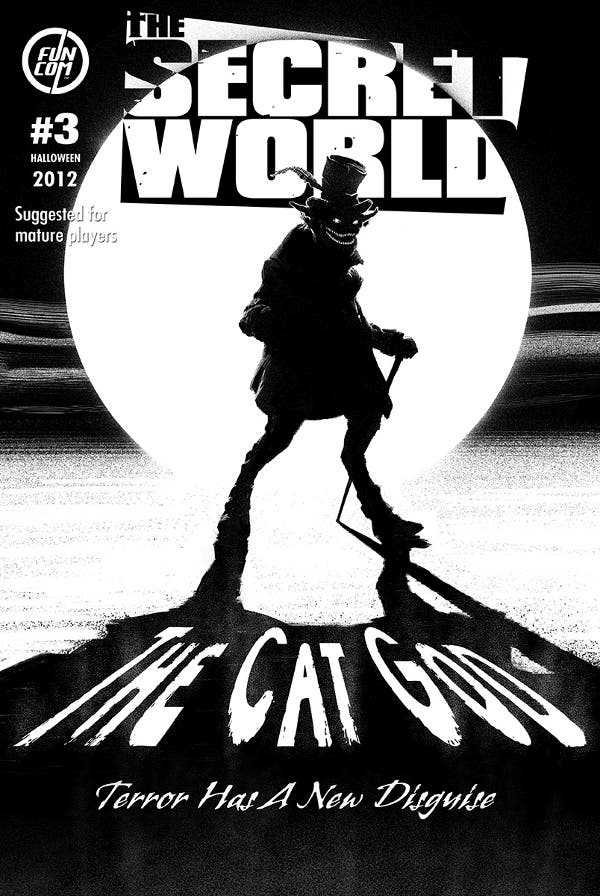
"We just don't want to go the expansion route."
Ragnar Tornquist
"It can be huge," Tornquist agreed. "There is a huge monthly update planned for next year. We just don't want to go the expansion route. We feel first that people pay the subscription fee, they're entitled to getting new content and to get new content in a way that they feel they get value for money."
What, no expansion packs ever?!
"That's impossible to say," Tornquist answered. "But we're not saving up content for big expansions. We're putting out content every month; we could easily save this content up. We could have had a pretty sizeable expansion out six months, nine months after launch. But instead we decided that players need this content on a monthly basis - it's much more important."
"If the game does grow then we might be able to split off an expansion team and have them work on a separate expansion while we're still delivering our monthly updates," Bylos continued.
"It's really important to us with the business model we've chosen - it sounds very emotional, but I almost feel like we need to prove that this business model has not gone the way of the dinosaur by delivering content constantly to people, and making people feel like there's value in it."
"Exactly," Tornquist joined in. "It's like running a cable channel. You don't save up all your shows for a big six-monthly drop of every episode of Game of Thrones, you produce content on an ongoing basis. And that's why people pay subscription to HBO. That's the foundation of a subscription model.
"It's absolutely on us to show people that we are delivering," Bylos declared. "People are a bit hesitant sometimes to jump into a subscription model, but what a deal you get six-months down the line when there's been six huge content patches and you get to jump in. All you have to pay for is the game, which has probably been reduced at that point - plus one month's subscription fee. And you get everything, rather than having to buy it piece by piece and having to buy $60, $70 dollars.
"There's that value for people who want to leave the game and come back, or people who want to try the game at a later date. All it does is accumulate value for the consumer."
Those aren't, to my mind, the words of a developer turning its game free-to-play.
"I'm working on The Secret World but of course I'm working on other ideas as well."
Ragnar Tornquist
The future of The Secret World
All of The Secret World content updates - Issues - up to Christmas "are in some state of progress", Tornquist told me - and there are content plans laid down until May next year. "And that's as far ahead as we want to think," he said, "because you want to be flexible as well."
"Beyond next spring it sort of depends on customer numbers," he added, "what our players want, how the game feels, the response of the press and the media - all those things."
The Secret World was Ragnar Tornquist's baby. His creative director job title didn't change when Joel Bylos was promoted to game director, but ownership of the game changed hands.
"A lot of things have actually changed in the structure," Tornquist said, such as him no longer having to man-manage. His role has become more broad and he has more time now than he used to - time he can spend thinking about other things.
"I'm working on The Secret World but of course I'm working on other ideas as well," he said. "But nothing that I'm going to talk about right now." Maybe he'll take a lead role on the Lego MMO Funcom has talked about.
As for The Secret World, Bylos has his team working on PVP updates; he's listened to fans complain about clothes being "too slutty" and how they want something "more demure"; he knows people want more stuff to do when not killing monsters; and he's looking into more faction interplay.
Issue #3: The Cat God was released last week. Issue #4: Big Trouble in the Big Apple, out some time this month, brings the game's first raid to New York. It also adds a new auxiliary weapon and new missions, as well as The Albion theatre in London where players can put on theatrical plays for other players. There's a timer on stage and if you're interesting people can keep you on, but if you're boring they can boo you off. Issue #5 will have more new missions, as every Issue will, but the feature list still isn't complete yet. New weapons will be added on "a continuous basis", said Tornquist.
Both Joel Bylos and Ragnar Tornquist are most excited about new zone Tokyo, the end of Act 1, which will be added next year.
I feel better about subscription MMOs after talking to Ragnar Tornquist and Joel Bylos. It used to be that monthly subs were an accepted part of MMOs; players understood that fees paid for the running costs of an online game and funded further development. Only when World of Warcraft showed how much recurring income a monthly subscription could generate did copycats get greedy eyes and the cash-cow branding begin. MMOs were made as a way to get rich.
Funcom downsizing may be a blessing in disguise. By accepting that The Secret World won't ever rival the popularity of World of Warcraft or Guild Wars 2, perhaps Funcom will stop trying to. And if you don't crave mass attention, you don't need to attract it; Funcom could concentrate on an undiluted experience for a hardcore audience as CCP has with Eve Online. With a steady income and sustainable development, Funcom could carve a fascinating niche for The Secret World.









